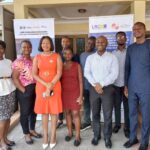Lawyer Clarke Noyoru, Project Co-ordinator of the Legal Resources Centre (LRC) has called on the media to avoid giving too much information on juveniles who had had a brush with law.
He explained that some journalists though would not mention the name of minors who had had conflict with the law or had had contact with the law but the description they give exposed them. This, he said was wrong.
Mr Noyoru brought this up during one of the regional fora of a three-year project, starting this year, sponsored by the European Union dubbed “Justice for Children: Bridging the gap between legislation and practice,” held in Accra on Thursday.
He advocated that journalist should report on issues but not the detailed information that leads to stigmatisation.
“Children cannot be blamed for becoming social deviants because some get to that stage due to divorce and especially, the breakdown of the extended family system that supported them whilst criminals also capitalise on them,” Mr Noyoru said.
Mr Noyoru said children who committed criminal offences (conflict with the law) and those who were called in as witnesses or charged for abetment (contact with the law) should not be treated the same way as adult offenders were treated.
He cited the situation whereby they were arrested, molested, tried by a court without jurisdiction and kept in adult cells, as not the best, as such situations hardened them, resulting in recidivism.
Children who were in conflict with the law were supposed to be kept at a correctional centre for reformation, which was limited in the country and even not conducive, he noted.
The Project Coordinator said they should not always be taken through the legal system as their cases could also be settled out of court or even after committal, they should be released into the society and monitored by a social welfare worker.
He called on stakeholders to always do pro-bono services (render free services) because justice for children was not always successful without free services.
Ms Daphne Lariba Nabila, Executive Director of LRC said the aim for the forum was to bridge the gap between legislation and practice within the Ghanaian Child Justice System to ensure that children who fell on the wrong side of the law were properly treated and protected.
Therefore, LRC in conjunction with the Ministry of Gender, Children and Social Protection, Parliament, Commission on Human Rights and Administrative Justice, Judicial Service, Prisons Service, among other stakeholders would promote that.
She said the programme was to help increase the legal assistance to children in conflict with the law, to strengthen partnership with stakeholders in the justice controlling system, to increase the capacity of security personnel in promoting the rights of children and to effect legal and policy reforms.
The Executive Director said the regional consultative programmes were held to propose policies for the amendment of specific legislation including the general justice sector, traditional leaders, and security agencies, while encouraging experts, school children and other regional stakeholders to identify gaps in the administering of justice within the justice delivery system in Ghana.
Also decisions taken during the programme will be used as reform proposals to review comprehensive policies for administering justice for children, she added.
Participants called on the Ghana Education Service to collaborate more with the National Commission on Civic Education to educate the children on how to be law abiding.
Source: http://www.ghananewsagency.org/social/media-advised-to-protect-identity-of-children-who-break-the-law-139318





